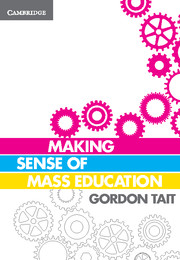Book contents
- Frontmatter
- Contents
- Acknowledgements
- INTRODUCTION
- PART 1 RE-ASSESSING THE THREE PILLARS: MODERN AND POSTMODERN SOCIOLOGIES OF EDUCATION
- PART 2 THE FOUNDATIONS OF AN ALTERNATIVE APPROACH: EDUCATION AND GOVERNANCE
- PART 3 CULTURAL CONTEXTS OF CONTEMPORARY EDUCATION
- PART 4 PHILOSOPHY AND MASS EDUCATION
- CHAPTER 10 PHILOSOPHY
- CHAPTER 11 ETHICS AND THE LAW
- CHAPTER 12 TRUTH AND POSTCOLONIALISM
- CONCLUSION
- References
- Index
CHAPTER 11 - ETHICS AND THE LAW
from PART 4 - PHILOSOPHY AND MASS EDUCATION
- Frontmatter
- Contents
- Acknowledgements
- INTRODUCTION
- PART 1 RE-ASSESSING THE THREE PILLARS: MODERN AND POSTMODERN SOCIOLOGIES OF EDUCATION
- PART 2 THE FOUNDATIONS OF AN ALTERNATIVE APPROACH: EDUCATION AND GOVERNANCE
- PART 3 CULTURAL CONTEXTS OF CONTEMPORARY EDUCATION
- PART 4 PHILOSOPHY AND MASS EDUCATION
- CHAPTER 10 PHILOSOPHY
- CHAPTER 11 ETHICS AND THE LAW
- CHAPTER 12 TRUTH AND POSTCOLONIALISM
- CONCLUSION
- References
- Index
Summary
This chapter address one of the most important areas of philosophy – ethics – and uses it to examine aspects of the role of the law within education. Of all the areas of philosophy, more has probably been written about ethics, and over a longer period, than any other. In addition, all cultures are structured around a fundamental ethical system: the law. However, irrespective of their importance, both subjects are currently notable for their lowly status within the teacher education curriculum.
Myth #1 Understanding ethics doesn't help you to be a good teacher
Knowing about ethics isn't a crucial part of being a good teacher. Teachers are there to teach a curriculum, not engage in complex ethical decision-making.
Teaching is an ethically challenging profession. By having a solid grasp of the strengths and weaknesses of different ethical approaches, teachers are more able to make informed moral choices, and hence contribute to a more just schooling system.
Myth #2 Unlike ethics, the law is straightforward, and everyone agrees upon what it is, and what it does
The law is the clear expression of our most important rules. There is no serious dispute over its purpose, or its objectivity.
On the contrary, the Australian system of law is complex, multilayered and highly contested. There is only limited agreement on how the law can be conceptualised, from being an extension of ‘natural’ rights and wrongs, to simply a political tool for the wealthy.
- Type
- Chapter
- Information
- Making Sense of Mass Education , pp. 227 - 253Publisher: Cambridge University PressPrint publication year: 2012



